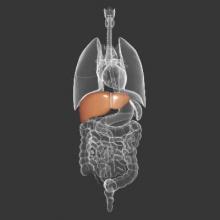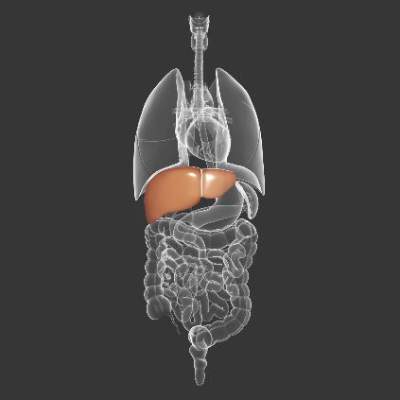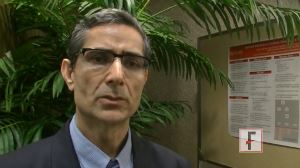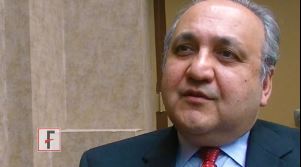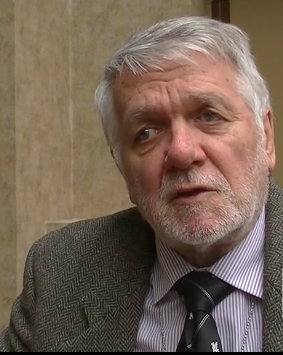User login
Don’t forget liver disease often has mental health component
PHILADELPHIA – To help ensure the best outcomes in patients with a range of liver pathologies, be alert for signs of neurologic and psychiatric abnormalities caused by hepatic encephalopathy, according to an expert.
“The patient doesn’t have to have cirrhosis or liver disease, but can just have portosystemic shunting with absolutely no liver disease, and still have hepatic encephalopathy,” Dr. Jasmohan S. Bajaj said at the meeting held by Global Academy for Medical Education and Rutgers, the State University of New Jersey.
Hepatic encephalopathy is believed to be due to dysbiosis caused by an altered bile acid profile, leading to an impaired intestinal barrier, which allows high levels of ammonia to circulate through the bloodstream, contributing to systemic inflammation and brain dysfunction, according to Dr. Bajaj, an associate professor of medicine at Virginia Commonwealth University and McGuire VA Medical Center, Richmond, Va.
“Ultimately, all the manifestations that we see are because of neuronal dysfunction, which is why the patient is depressed, anxious, sleepy, and has tremors,” Dr. Bajaj said.
Guidelines issued by the American Association for the Study of Liver Diseases stratify hepatic encephalopathy into four grades, the first being the difficult-to-detect subclinical form that is present in up at as many as 60% of patients with hepatic pathologies.
Because covert hepatic encephalopathy will likely progress to a more overt form, adversely impacting a patient’s quality of life and other outcomes, Dr. Bajaj emphasized the importance of testing for it.
One means of detection is to evaluate a patient’s response time using a modified version of the psychiatric Stroop test that measures cognitive dysfunction. Another is to consider collaborative care with a psychologist who can test for and diagnose cognitive impairment. Patients who select at least four items in the Sickness Impact Profile are “80% likely” to have covert hepatic encephalopathy, according to Dr. Bajaj.
Overt manifestations of hepatic encephalopathy include obvious signs of altered mental status, usually reported by the caregiver. Clinicians should consider as part of their differential diagnosis for overt hepatic encephalopathy whether the patient is diabetic, intoxicated, suffering an electrolyte disorder, or is experiencing intracranial bleeding or stroke, and should consider precipitating factors such as an infection, gastrointestinal bleeding, or an overdose of diuretics.
Avoid treatment decisions based on blood ammonia status superseding a patient’s mental status because “there are many people who are completely alert who have high ammonia levels,” Dr. Bajaj said. “When the patient presents at the emergency [department] with confusion but has a completely normal ammonia level, that is the only time ammonia levels are useful.”
Treating hepatic encephalopathy is possible by reducing the nitrogenous load in the gut with lactulose, rifaximin, probiotics, or laxatives, according to Dr. Bajaj, who noted that most overt hepatic encephalopathy patients will require inpatient evaluation, and that in cases with recurrent precipitating factors, patients should be considered for liver transplant suitability.
Dr. Bajaj said he receives grant support from Grifols, Norgine, and Salix.
Global Academy and this news organization are owned by the same company.
On Twitter @whitneymcknight
PHILADELPHIA – To help ensure the best outcomes in patients with a range of liver pathologies, be alert for signs of neurologic and psychiatric abnormalities caused by hepatic encephalopathy, according to an expert.
“The patient doesn’t have to have cirrhosis or liver disease, but can just have portosystemic shunting with absolutely no liver disease, and still have hepatic encephalopathy,” Dr. Jasmohan S. Bajaj said at the meeting held by Global Academy for Medical Education and Rutgers, the State University of New Jersey.
Hepatic encephalopathy is believed to be due to dysbiosis caused by an altered bile acid profile, leading to an impaired intestinal barrier, which allows high levels of ammonia to circulate through the bloodstream, contributing to systemic inflammation and brain dysfunction, according to Dr. Bajaj, an associate professor of medicine at Virginia Commonwealth University and McGuire VA Medical Center, Richmond, Va.
“Ultimately, all the manifestations that we see are because of neuronal dysfunction, which is why the patient is depressed, anxious, sleepy, and has tremors,” Dr. Bajaj said.
Guidelines issued by the American Association for the Study of Liver Diseases stratify hepatic encephalopathy into four grades, the first being the difficult-to-detect subclinical form that is present in up at as many as 60% of patients with hepatic pathologies.
Because covert hepatic encephalopathy will likely progress to a more overt form, adversely impacting a patient’s quality of life and other outcomes, Dr. Bajaj emphasized the importance of testing for it.
One means of detection is to evaluate a patient’s response time using a modified version of the psychiatric Stroop test that measures cognitive dysfunction. Another is to consider collaborative care with a psychologist who can test for and diagnose cognitive impairment. Patients who select at least four items in the Sickness Impact Profile are “80% likely” to have covert hepatic encephalopathy, according to Dr. Bajaj.
Overt manifestations of hepatic encephalopathy include obvious signs of altered mental status, usually reported by the caregiver. Clinicians should consider as part of their differential diagnosis for overt hepatic encephalopathy whether the patient is diabetic, intoxicated, suffering an electrolyte disorder, or is experiencing intracranial bleeding or stroke, and should consider precipitating factors such as an infection, gastrointestinal bleeding, or an overdose of diuretics.
Avoid treatment decisions based on blood ammonia status superseding a patient’s mental status because “there are many people who are completely alert who have high ammonia levels,” Dr. Bajaj said. “When the patient presents at the emergency [department] with confusion but has a completely normal ammonia level, that is the only time ammonia levels are useful.”
Treating hepatic encephalopathy is possible by reducing the nitrogenous load in the gut with lactulose, rifaximin, probiotics, or laxatives, according to Dr. Bajaj, who noted that most overt hepatic encephalopathy patients will require inpatient evaluation, and that in cases with recurrent precipitating factors, patients should be considered for liver transplant suitability.
Dr. Bajaj said he receives grant support from Grifols, Norgine, and Salix.
Global Academy and this news organization are owned by the same company.
On Twitter @whitneymcknight
PHILADELPHIA – To help ensure the best outcomes in patients with a range of liver pathologies, be alert for signs of neurologic and psychiatric abnormalities caused by hepatic encephalopathy, according to an expert.
“The patient doesn’t have to have cirrhosis or liver disease, but can just have portosystemic shunting with absolutely no liver disease, and still have hepatic encephalopathy,” Dr. Jasmohan S. Bajaj said at the meeting held by Global Academy for Medical Education and Rutgers, the State University of New Jersey.
Hepatic encephalopathy is believed to be due to dysbiosis caused by an altered bile acid profile, leading to an impaired intestinal barrier, which allows high levels of ammonia to circulate through the bloodstream, contributing to systemic inflammation and brain dysfunction, according to Dr. Bajaj, an associate professor of medicine at Virginia Commonwealth University and McGuire VA Medical Center, Richmond, Va.
“Ultimately, all the manifestations that we see are because of neuronal dysfunction, which is why the patient is depressed, anxious, sleepy, and has tremors,” Dr. Bajaj said.
Guidelines issued by the American Association for the Study of Liver Diseases stratify hepatic encephalopathy into four grades, the first being the difficult-to-detect subclinical form that is present in up at as many as 60% of patients with hepatic pathologies.
Because covert hepatic encephalopathy will likely progress to a more overt form, adversely impacting a patient’s quality of life and other outcomes, Dr. Bajaj emphasized the importance of testing for it.
One means of detection is to evaluate a patient’s response time using a modified version of the psychiatric Stroop test that measures cognitive dysfunction. Another is to consider collaborative care with a psychologist who can test for and diagnose cognitive impairment. Patients who select at least four items in the Sickness Impact Profile are “80% likely” to have covert hepatic encephalopathy, according to Dr. Bajaj.
Overt manifestations of hepatic encephalopathy include obvious signs of altered mental status, usually reported by the caregiver. Clinicians should consider as part of their differential diagnosis for overt hepatic encephalopathy whether the patient is diabetic, intoxicated, suffering an electrolyte disorder, or is experiencing intracranial bleeding or stroke, and should consider precipitating factors such as an infection, gastrointestinal bleeding, or an overdose of diuretics.
Avoid treatment decisions based on blood ammonia status superseding a patient’s mental status because “there are many people who are completely alert who have high ammonia levels,” Dr. Bajaj said. “When the patient presents at the emergency [department] with confusion but has a completely normal ammonia level, that is the only time ammonia levels are useful.”
Treating hepatic encephalopathy is possible by reducing the nitrogenous load in the gut with lactulose, rifaximin, probiotics, or laxatives, according to Dr. Bajaj, who noted that most overt hepatic encephalopathy patients will require inpatient evaluation, and that in cases with recurrent precipitating factors, patients should be considered for liver transplant suitability.
Dr. Bajaj said he receives grant support from Grifols, Norgine, and Salix.
Global Academy and this news organization are owned by the same company.
On Twitter @whitneymcknight
AT DIGESTIVE DISEASES: NEW ADVANCES
VIDEO: Stenting to improve quality of life in esophageal cancer
PHILADELPHIA – An esophageal stent can improve quality of life for patients with advanced esophageal cancer, according to Dr. Sushil Ahlawat, director of endoscopy at Rutgers University, New Brunswick, N.J.
“An esophageal stent can be an important modality for palliating patients’ dysphagia, [which] can happen because the tumor is obstructing the esophagus,” says Dr. Ahlawat in this video. He also discusses how this minimally invasive procedure can support those undergoing chemoradiation therapy or surgery for esophageal cancer.
The video was recorded at this year’s meeting, held by Global Academy for Medical Education and Rutgers, the State University of New Jersey. Global Academy for Medical Education and this news organization are owned by the same company.
The video associated with this article is no longer available on this site. Please view all of our videos on the MDedge YouTube channel
On Twitter @whitneymcknight
PHILADELPHIA – An esophageal stent can improve quality of life for patients with advanced esophageal cancer, according to Dr. Sushil Ahlawat, director of endoscopy at Rutgers University, New Brunswick, N.J.
“An esophageal stent can be an important modality for palliating patients’ dysphagia, [which] can happen because the tumor is obstructing the esophagus,” says Dr. Ahlawat in this video. He also discusses how this minimally invasive procedure can support those undergoing chemoradiation therapy or surgery for esophageal cancer.
The video was recorded at this year’s meeting, held by Global Academy for Medical Education and Rutgers, the State University of New Jersey. Global Academy for Medical Education and this news organization are owned by the same company.
The video associated with this article is no longer available on this site. Please view all of our videos on the MDedge YouTube channel
On Twitter @whitneymcknight
PHILADELPHIA – An esophageal stent can improve quality of life for patients with advanced esophageal cancer, according to Dr. Sushil Ahlawat, director of endoscopy at Rutgers University, New Brunswick, N.J.
“An esophageal stent can be an important modality for palliating patients’ dysphagia, [which] can happen because the tumor is obstructing the esophagus,” says Dr. Ahlawat in this video. He also discusses how this minimally invasive procedure can support those undergoing chemoradiation therapy or surgery for esophageal cancer.
The video was recorded at this year’s meeting, held by Global Academy for Medical Education and Rutgers, the State University of New Jersey. Global Academy for Medical Education and this news organization are owned by the same company.
The video associated with this article is no longer available on this site. Please view all of our videos on the MDedge YouTube channel
On Twitter @whitneymcknight
EXPERT ANALYSIS FROM DIGESTIVE DISEASES: NEW ADVANCES
VIDEO: How to recognize and treat nonalcoholic fatty liver disease
PHILADELPHIA – Nonalcoholic fatty liver disease is on the rise worldwide, but many clinicians are unaware of how to recognize this potentially fatal condition, in part because it can be difficult to separate from common comorbidities such as obesity and diabetes.
In an interview at the Digestive Diseases: New Advances 2016 meeting, held by Global Academy for Medical Education and Rutgers, the State University of New Jersey, Dr. Zobair M. Younossi, chairman of the department of medicine at Inova Fairfax (Va.) Hospital, discussed what clinicians should know in order to screen for and treat this disease.
Dr. Younossi said he is a consultant to Conatus Pharmaceuticals, Enterome Bioscience, and Gilead, and on the advisory boards of Janssen, Salix Pharmaceuticals, and Vertex Pharmaceuticals.
Global Academy and this news organization are owned by the same company.
On Twitter @whitneymcknight
PHILADELPHIA – Nonalcoholic fatty liver disease is on the rise worldwide, but many clinicians are unaware of how to recognize this potentially fatal condition, in part because it can be difficult to separate from common comorbidities such as obesity and diabetes.
In an interview at the Digestive Diseases: New Advances 2016 meeting, held by Global Academy for Medical Education and Rutgers, the State University of New Jersey, Dr. Zobair M. Younossi, chairman of the department of medicine at Inova Fairfax (Va.) Hospital, discussed what clinicians should know in order to screen for and treat this disease.
Dr. Younossi said he is a consultant to Conatus Pharmaceuticals, Enterome Bioscience, and Gilead, and on the advisory boards of Janssen, Salix Pharmaceuticals, and Vertex Pharmaceuticals.
Global Academy and this news organization are owned by the same company.
On Twitter @whitneymcknight
PHILADELPHIA – Nonalcoholic fatty liver disease is on the rise worldwide, but many clinicians are unaware of how to recognize this potentially fatal condition, in part because it can be difficult to separate from common comorbidities such as obesity and diabetes.
In an interview at the Digestive Diseases: New Advances 2016 meeting, held by Global Academy for Medical Education and Rutgers, the State University of New Jersey, Dr. Zobair M. Younossi, chairman of the department of medicine at Inova Fairfax (Va.) Hospital, discussed what clinicians should know in order to screen for and treat this disease.
Dr. Younossi said he is a consultant to Conatus Pharmaceuticals, Enterome Bioscience, and Gilead, and on the advisory boards of Janssen, Salix Pharmaceuticals, and Vertex Pharmaceuticals.
Global Academy and this news organization are owned by the same company.
On Twitter @whitneymcknight
AT DIGESTIVE DISEASES: NEW ADVANCES 2016
VIDEO: Myths and truths of gluten-free diets
PHILADELPHIA – Do you have patients with undiagnosed celiac disease or legitimate gluten sensitivity, or are they self-diagnosing with the need to steer clear of gluten, only to find themselves in danger of nutritional deficiencies and other health concerns?
Of the roughly 1% of Americans who have celiac disease, only about 17% ever receive a diagnosis, leaving the remainder at risk for serious health complications, according to Dr. Peter H.R. Green, director of the Celiac Disease Center at Columbia University, New York.
Meanwhile, many people choose to go gluten free, which Dr. Green calls the most popular “fad” diet in the country. Aside from this trend being more expensive, and often inconvenient, it’s also a health risk. “It’s ironic that so many people who should be on a gluten-free diet aren’t, and those who are don’t need to be, and might even be harming their health,” he said in an interview.
In this video, Dr. Green discusses how to determine whether patients have celiac disease or another diagnosis, and how to counsel those who do have the disease and those who don’t.
The video was recorded at this year’s Digestive Diseases: New Advances, held by Global Academy for Medical Education and Rutgers, the State University of New Jersey. Global Academy and this news organization are owned by the same company.
On Twitter @whitneymcknight
PHILADELPHIA – Do you have patients with undiagnosed celiac disease or legitimate gluten sensitivity, or are they self-diagnosing with the need to steer clear of gluten, only to find themselves in danger of nutritional deficiencies and other health concerns?
Of the roughly 1% of Americans who have celiac disease, only about 17% ever receive a diagnosis, leaving the remainder at risk for serious health complications, according to Dr. Peter H.R. Green, director of the Celiac Disease Center at Columbia University, New York.
Meanwhile, many people choose to go gluten free, which Dr. Green calls the most popular “fad” diet in the country. Aside from this trend being more expensive, and often inconvenient, it’s also a health risk. “It’s ironic that so many people who should be on a gluten-free diet aren’t, and those who are don’t need to be, and might even be harming their health,” he said in an interview.
In this video, Dr. Green discusses how to determine whether patients have celiac disease or another diagnosis, and how to counsel those who do have the disease and those who don’t.
The video was recorded at this year’s Digestive Diseases: New Advances, held by Global Academy for Medical Education and Rutgers, the State University of New Jersey. Global Academy and this news organization are owned by the same company.
On Twitter @whitneymcknight
PHILADELPHIA – Do you have patients with undiagnosed celiac disease or legitimate gluten sensitivity, or are they self-diagnosing with the need to steer clear of gluten, only to find themselves in danger of nutritional deficiencies and other health concerns?
Of the roughly 1% of Americans who have celiac disease, only about 17% ever receive a diagnosis, leaving the remainder at risk for serious health complications, according to Dr. Peter H.R. Green, director of the Celiac Disease Center at Columbia University, New York.
Meanwhile, many people choose to go gluten free, which Dr. Green calls the most popular “fad” diet in the country. Aside from this trend being more expensive, and often inconvenient, it’s also a health risk. “It’s ironic that so many people who should be on a gluten-free diet aren’t, and those who are don’t need to be, and might even be harming their health,” he said in an interview.
In this video, Dr. Green discusses how to determine whether patients have celiac disease or another diagnosis, and how to counsel those who do have the disease and those who don’t.
The video was recorded at this year’s Digestive Diseases: New Advances, held by Global Academy for Medical Education and Rutgers, the State University of New Jersey. Global Academy and this news organization are owned by the same company.
On Twitter @whitneymcknight
EXPERT ANALYSIS FROM DIGESTIVE DISEASES: NEW ADVANCES
VIDEO: Management of difficult-to-treat IBD cases
PHILADELPHIA – The lack of evidence-based management strategies for the treatment of difficult inflammatory bowel disease cases, such as with Crohn’s disease, can lead to confusion for some clinicians.
Dr. Mark T. Osterman, assistant professor of medicine at the University of Pennsylvania, Philadelphia, discusses when to use antibiotics in Crohn’s disease and when to consider antibiotics in combination with draining fistulae. He also discusses available pharmacotherapies, and the value of bowel rest.
“The best treatment of all for difficult inflammatory bowel disease is aggressive and early, so that the condition doesn’t go from bad to worse,” Dr. Osterman said.
The video was recorded at this year’s meeting of Digestive Diseases: New Advances, a meeting held by Global Academy for Medical Education and Rutgers, the State University of New Jersey. Global Academy and this news organization are owned by the same company.
The video associated with this article is no longer available on this site. Please view all of our videos on the MDedge YouTube channel
On Twitter @whitneymcknight
PHILADELPHIA – The lack of evidence-based management strategies for the treatment of difficult inflammatory bowel disease cases, such as with Crohn’s disease, can lead to confusion for some clinicians.
Dr. Mark T. Osterman, assistant professor of medicine at the University of Pennsylvania, Philadelphia, discusses when to use antibiotics in Crohn’s disease and when to consider antibiotics in combination with draining fistulae. He also discusses available pharmacotherapies, and the value of bowel rest.
“The best treatment of all for difficult inflammatory bowel disease is aggressive and early, so that the condition doesn’t go from bad to worse,” Dr. Osterman said.
The video was recorded at this year’s meeting of Digestive Diseases: New Advances, a meeting held by Global Academy for Medical Education and Rutgers, the State University of New Jersey. Global Academy and this news organization are owned by the same company.
The video associated with this article is no longer available on this site. Please view all of our videos on the MDedge YouTube channel
On Twitter @whitneymcknight
PHILADELPHIA – The lack of evidence-based management strategies for the treatment of difficult inflammatory bowel disease cases, such as with Crohn’s disease, can lead to confusion for some clinicians.
Dr. Mark T. Osterman, assistant professor of medicine at the University of Pennsylvania, Philadelphia, discusses when to use antibiotics in Crohn’s disease and when to consider antibiotics in combination with draining fistulae. He also discusses available pharmacotherapies, and the value of bowel rest.
“The best treatment of all for difficult inflammatory bowel disease is aggressive and early, so that the condition doesn’t go from bad to worse,” Dr. Osterman said.
The video was recorded at this year’s meeting of Digestive Diseases: New Advances, a meeting held by Global Academy for Medical Education and Rutgers, the State University of New Jersey. Global Academy and this news organization are owned by the same company.
The video associated with this article is no longer available on this site. Please view all of our videos on the MDedge YouTube channel
On Twitter @whitneymcknight
EXPERT ANALYSIS FROM DIGESTIVE DISEASES: NEW ADVANCES
